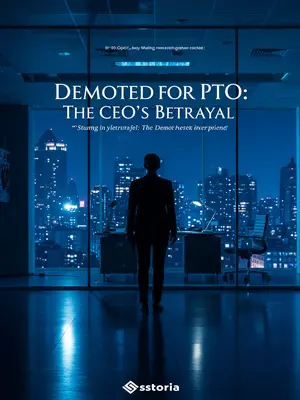Chapter 2: The Performance Trap
The first round with Megan left me rattled. But HR wasn’t done yet. Twenty minutes later, another summons landed in my inbox.
I had just started my day when an email popped up—a meeting invite from HR. No subject, scheduled for half an hour later.
There it was: the digital equivalent of a knock on the principal’s door. My stomach dropped. HR never did this unless something was up. I glanced at the time, my half-empty travel mug of gas station coffee suddenly tasting like motor oil.
My heart skipped a beat. Meetings like this—no subject, sudden, and from HR—are never good news.
I clicked accept, and when the time came, I went to the conference room.
I walked through the maze of cubicles, trying to ignore the sympathetic glances from coworkers. We all knew what these meetings meant. If it wasn’t about health insurance or the annual charity drive, it was never a good sign.
HR was already there, skipping any small talk and getting straight to the point:
"Based on our recent performance assessment, as the company’s HR, I believe you’re not competent for your current job."
I almost let out a laugh—this wasn’t a layoff, it was a trial. Megan’s tone was icy, the kind reserved for reciting company policy or announcing layoffs at Christmas.
"Megan, my performance has always been the best in the department. Where exactly am I incompetent?"
"Does being number one in performance really prove you’re capable? Why are you erasing the team’s contributions? That just shows you lack team spirit."
I could practically hear the HR handbook flipping open in her head. Team spirit—what a line.
"But the support team in our marketing department is the same for everyone. If my performance is the best, doesn’t that prove I’m more capable?"
From her first sentence, I realized she was just here to nitpick. Maybe my mistake was even showing up to this meeting.
I was too optimistic. This kind of disgusting psychological warfare—if you’re going to lay me off, just do it already.
I could feel the frustration simmering beneath my calm facade. This wasn’t about teamwork—it was about finding an excuse to push me out the door.
"Good performance could be luck. If someone else took over your clients, they’d bring in the same business."
"I’ve been number one for five months straight. Can you still call that luck?"
"Five months at number one isn’t anything special. Look at your sales—they haven’t grown. You can’t just keep living off past achievements, right?"
"It’s a down market. Maintaining these sales numbers is a daily battle. Check the competition—most of them have seen their business cut in half."
"So you’re making excuses for not growing your sales?"
"It’s not about making excuses. I just want to point out that your doubts about my work ability are baseless."
Watching HR argue so unreasonably, my patience was wearing thin.
I tapped my pen against my notepad, forcing myself not to say what I was really thinking. I’d been through enough quarterly reviews to know this wasn’t about numbers anymore.
"Derek, I finally see your problem. When your numbers are good, you say it’s your ability. When sales don’t grow, you blame the market or the company. Can’t you ever consider that the problem might be you? It can’t always be that the good results are your doing, and the bad ones are the environment’s fault, right?"
At this point, I was more than out of patience—I was about to lose it.
I took a slow breath, staring at the framed motivational poster on the wall—Teamwork Makes the Dream Work. The irony was almost painful.
"Megan, I request that my manager join this discussion about my performance. I can’t make this clear to you alone."
"What’s so unclear? If something isn’t done well, there are many reasons, but you shouldn’t always blame the environment. Shouldn’t you reflect on yourself too?"
I closed my eyes, took a deep breath, and tried desperately to resist the urge to throw my water bottle at her.
The cap squeaked under my grip. I counted to five. HR’s whole game was to get me to snap. I wouldn’t give her the satisfaction.
"Fine. I reserve my opinion on your evaluation of me. But if you think I’m not competent for my job, may I ask if there’s any training or a reassignment plan?"
"The company doesn’t keep people around who aren’t contributing. There are no resources for your training. As for reassignment, you’d need to go through an interview."
"Just say it directly. What do you really want?"
I stared her down, the question hanging in the air. Her lips pressed into a thin, corporate smile—one that said she’d already made up her mind.













